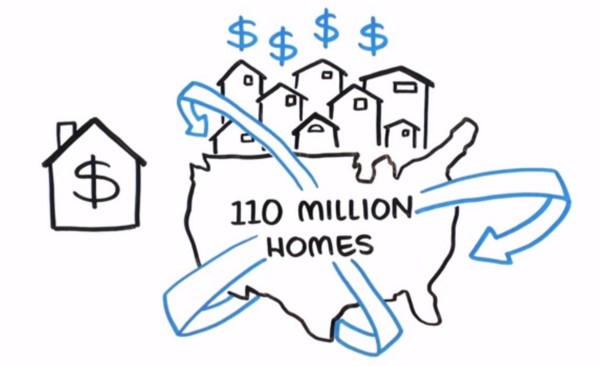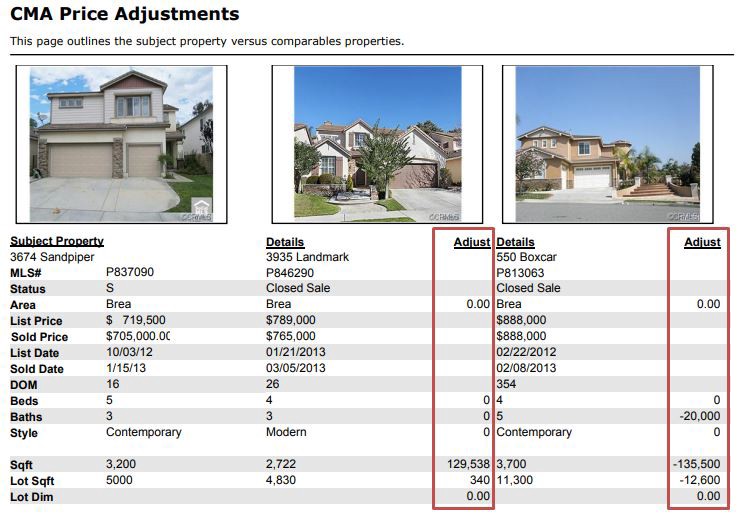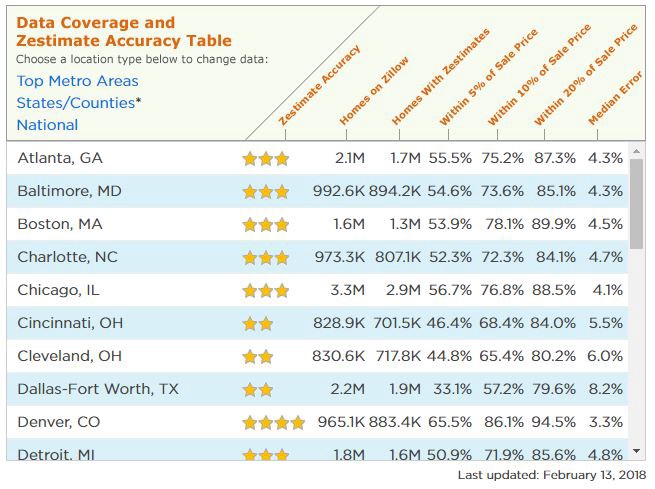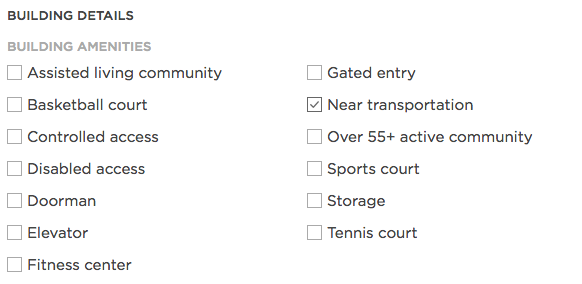You are viewing our site as an Agent, Switch Your View:
Agent | Broker Reset Filters to Default Back to ListHow Agents Can Benefit from the Zestimate
June 17 2019
The Famous Zillow Zestimate
Zillow defines its Zestimate as the "estimated market value for an individual home," and one that is "…a starting point in determining a home's value and is not an official appraisal."
Sounds harmless, no? While the Zestimate's goal to assist in the automation of home valuation is well intended, the challenges it has created for real estate agents, home buyers, and home sellers has left Zillow, and those who followed in its path, with an arduous defense battle, inclusive of actual litigation (more on that below).

Credit: Zillow.com
At the core of the issue is the fact that the Zestimate, and any automated home valuation models to this point, is inherently flawed. Even the most advanced statistical models cannot account accurately for discrepancies in home features, timeliness, and quality of the data.
It is easy to see why agents are frustrated with buyers who base offers on the Zestimate, but for agents who truly understand what it is and take the time educate their buyers, it can become an advantage.
How It Is Created…and Why It Is Not a CMA
Traditionally, real estate agents and appraisers looks for recently sold homes in the same geographic neighborhood with similar features, and then adjust their estimate of the subject home based on the estimated value of these differences. For example, an appraiser may deduct $5,000 from the subject home if one home is similar but has a garage while the subject offers only street parking. Similarly, the subject home value would be increased for desirable features it has that other recently sold homes do not. In the end, this ends up feeling and looking as much like art as science. This is the basics of comparable market analysis (CMA).

Example CMA (credit)
Zillow claims their methodology differs from the traditional comparable market analysis described above because they incorporate a much larger geographic area
Zillow uses a proprietary algorithm that similarly considers physical attributes, tax assessments, and transactions to influence and inform statistical relationships that are defined within geographic areas and comparable homes to derive an estimated value in an automated fashion. Zillow claims their methodology differs from the traditional comparable market analysis described above because they incorporate a much larger geographic area, often times using data in a county. This has the benefit of providing the model more data to use, but can also work against the model as similarity and pricing between homes can change drastically (the "garbage in, garbage out" argument). Here in Chicago, there can easily be a $100k difference just from crossing the street from one neighborhood to the next between similar homes!
Worse yet, Zillow data is often scant in many markets, outdated, or simply incorrect.
A Thought Experiment
Setting aside statistical challenges, a simple thought experiment is worthwhile: There exist two houses that are exactly identical and are next door to each other (which often happens with new, multi-unit builds). Hypothetically, the value and Zestimate for each unit are exactly the same. However, the next day I come in and remove all the appliances, flooring, and electrical from one of the units. It's quite likely, if not guaranteed, the Zestimate will not reflect this until the building is sold.
While Zillow allows consumers to claim their home and correct any errors, there is no incentive to provide updates that would negatively influence a homeowner's Zestimate. This correction would not take place until the home is sold, at presumably a much lower price.
So How Accurate Is It?
Zillow qualifies their answer with, "it depends on location and availability of data in an area." The median error rate is 4.6%, meaning half the homes in a given area end up selling within 4.6% of the Zestimate and the other half are off by more than 4.6%.

Credit: Zillow
Chicago's median area rate is a bit tighter, at approximately 4%. However, only 77% of homes sold for within 10% of the Zestimate. For many neighborhoods in Chicago, a $500k home is not unusual, and this means an error rate of $50k! Imagine listing your home after discussing with a knowledgeable Realtor at what is strongly believed to be a market value of $500k, and seeing alongside the list price a Zestimate value of $450k. Awesome.
Many home sellers are not pleased by that, and in fact, it's forced Zillow to defend itself through litigation. Zillow's strong language that the Zestimate is not an official appraisal protects them from legal battles such as these, but to consumers, the Zestimate can often act as an (arbitrary) anchor and self-fulfilling prophecy.

Zillow allows homeowners to edit the facts of their home. Wonder how much a basketball court would increase my Zestimate!?
As mentioned, Zillow allows users to "claim their house" and update facts on their home without confirmation. I could very easily change the square footage on my condo and check boxes indicating my home has amenities no listing agent can lawfully include in the MLS, and it is likely my Zestimate will increase. Add "easily manipulated" to the challenges of the Zestimate.
The truth is there are far too many variables to consider in a model to accurately and quantitatively define home value, especially one where "value" is perceived differently by nearly every observer. Tastes and preferences change frequently, as do influencing factors such as interest rates, demographics, and housing supply. I do not doubt Zillow has created a statically robust, valid, and acceptable model, but models that exist in academia are often times inapplicable in the real world (my background in quantitative investment research aside). So how should consumers use the Zestimate—and more importantly, how can agents benefit from it?
How to Use It
Used appropriately, the Zestimate value can be a powerful tool for an informed buyer, seller, and/or agent. Agents should fully understand the creation, advantages, and disadvantages of the Zestimate to better educate their clients who rely too heavily on the figure when making decisions.

credit: pexels.com
These conversations are likely best placed up front when meeting a client. Consumers love searching on the portals, so it's probably safe to assume two things: the prospect or client is well versed on Zillow and they're intimately familiar with what the Zestimate is—however, they're less likely to be well educated on how it works and what it truly means. This is a great opportunity as an agent to express your knowledge and establish trust.
Real estate agents are no longer the industry gatekeepers. Zillow and the portals have aided in creating more informed home buyers and sellers, and it's more important than ever that agents continue to educate their clients with how to use that information. Home searching is just the start of the process and agents who operate on the same playing field as their clients can use the Zillows of the world to their advantage.
To view the original article, visit the Homebloq blog.









